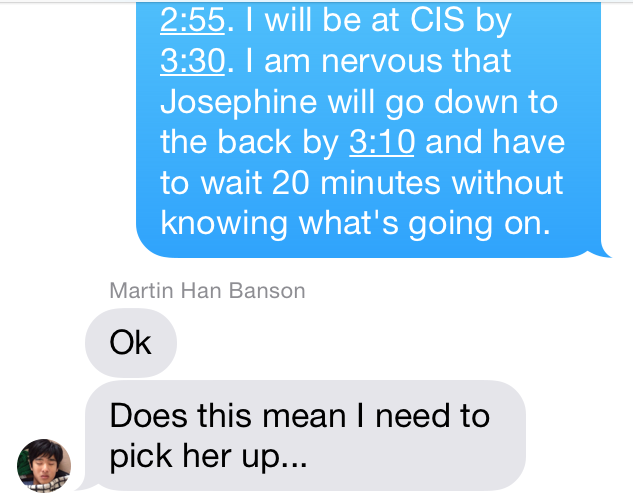The Problem with Solutions
Two things happened recently that made me realize, wow, solutioning really gets my back up. (I hear it's kind of an American thing to make a verb out of a noun but I WAS born in Philly so I'm just going with it.) Don't get me wrong, I'm superb at solutioning; it's just that I don't like being on the receiving end.
The first instance took place a couple of weeks ago when mold infiltrated our home, as it is wont to do in Hong Kong. This had happened in a big, bad way a few years ago so we sprang into action at the first whiff of the black stuff. Actually, this time, because I just had so much going on and because it was relatively early going, my helper did all of the work.
A few days in, she was NOT happy because her other tasks had had to take a back seat. One day, around lunch time, she confronted me forcefully, "You have to take the kids out to eat tonight! I just have so much work to do!"
What do you think I said in response? I can proudly say that my P.E.T. and mindfulness efforts paid off!
Doing a quick Behavior Window analysis, I realized that she owned the problem and guessed that her unmet needs were probably control, efficacy, self-esteem and rest. I Active Listened her, "Sure. It seems like you are super stressed because this has just been such a lot of work and your normal workload is still hanging over your head. It's really hard to relax." She immediately experienced a temperature cool-down and said sheepishly, "Sorry, Ate."
The second event happened just last week when I got a pretty nerve-wracking phone call during morning drop-offs. (My mother's health had gotten shaky again.) I drove past the normal spot and my husband quietly asked, "Do you know where you are going?" I braked for him as soon as I could which happened to be at an empty bus stop, all the while checking the rear view mirror and still talking to my mother. As he left the car, he told me: "Don't get into an accident and kill yourself!"
Now, what my helper and husband said fits squarely under the heading of "solution messages" laid out in Thomas Gordon's book Parent Effectiveness Training: The Proven Program for Raising Responsible Children. Under that umbrella, he lists four of the twelve types of Roadblocks:
- Ordering, Directing, Commanding
- Warning, Admonishing, Threatening
- Exhorting, Preaching, Moralizing
- Advising, Giving Suggestions or Solutions
Gordon says the problem with communicating to the child (or anyone) YOUR solution for her is that she will often want to resist. What's more, it shows either that you don't trust her to select her own solution or that you don't think she is sensitive or caring enough to want to help you.
I, for one, would prefer to be given more credit so I'll take a Confrontive I-Message any day. Such messages, in their strongest form, have three parts:
- Non-judgmental description of behavior
- Primary, congruent feelings
- Concrete, tangible effects
So that would translate into something like:
Helper: "When you asked for this dinner to be made tonight, I felt really annoyed and upset because I have so much other work that's piled up and I feel so stressed."
Husband: "I'm worried you might get into a really serious accident because you just missed my stop and you're still talking on the phone."
They would be sharing their internal experience with me with the expectation that 1) I will understand and want to help by changing my behavior and 2) I am smart enough to figure out how.
You see, with my helper, I would have jumped in with "OMG, I am so sorry, I didn't realize you were so stressed. I'll take the kids out to dinner tonight so you have more time!" but I wasn't given that chance.
As for my husband, my former self would have shot back, "I don't like your tone! Don' t you think I know that? I'm just dealing with something big here!" (I might even have added "You drive from now on!" -- my, what a temper.) In his defense, you could argue that my husband had a valid point. The thing is, I myself knew that I was being a little reckless; it's just that I was in an emotionally upset state. We can all use some slack then.
We've been together 21 years
Instead of locking horns, I focused on what I believe was my husband's primary emotion -- fear of losing me. His true message was, in fact, that I am beloved.
Surely it's a tall order to ask our KIDS to rein in their resistance, hear below our solutioning and meet us on that level!
That's why P.E.T. teaches skills that can replace these Roadblocks whenever possible. When our child has a problem, we learn Active Listening instead of immediately offering our ideas for how the he can make it better. With Method III problem-solving, we learn to focus on needs rather than battle over solutions. With Preventive I-Messages, we practice how to mention a future need and then just stop and see what unfolds. I had to think about it consciously, but here's how I recently let my son be the first to come up with a suggestion (however tentative):
Looking back on my many years of being a mother, I realize giving orders, advice and solutions has gotten me burned countless times. Jake used to have tantrums when little; now he reminds me, "You don’t have to tell me!" My 16 year old too has let me know he doesn't appreciate it.
I am so not alone. The four year old son of a class participant recently explained it quite eloquently when his mother suggested he transfer money from his wallet to his "dinosaur" savings: "Mom, my life is MY life, not yours, ok?" (Did you catch that he is FOUR?)
So let's not shoot ourselves in the foot, especially, I think, when dealing with autonomous kids. I mean, what if you're happily going along and innocently give a solution but your child doesn't like it? You might suddenly find yourself triggered by the defensive pushback and then you've slipped out of the delicious No Problem zone.
I know this is pretty unnatural for most of us. Remember, I don't think I have ever yet experienced that "Unconsciously Skilled" stage (and my mistakes warrant a whole series!) And it's not that we should never advise or direct our children to do something. Yet cutting back on solutioning not only preserves relationships, but also furthers the long term goals we have for our children. When we make our group list in the first session, the words "independent" and "problem-solver" always come up. (Oh yeah, and "mature," "responsible" and "self-directed" are other popular ones.)
We try to keep our eyes on the prize
So the first step is to just start noticing. Maybe watch how other people -- how about your parents or in-laws (wink, wink)? -- Roadblock you in these ways and how that makes you feel. Then try to catch yourself doing it to your own child and, instead, give her the benefit of the doubt. NO solution just might turn out to be THE solution.
Do you have a favorite Roadblock that you excel at? (I was REALLY good at preaching.) What are your strategies for weaning yourself? I welcome your comments below!
Credits: http://www.forbes.com/sites/mikemyatt/2012/05/31/the-simple-solution-for-improved-performance/







